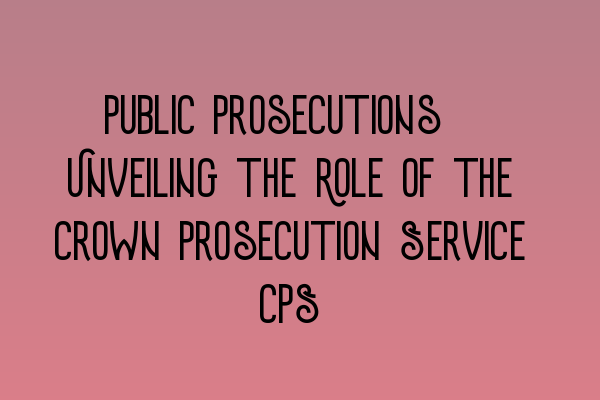Public Prosecutions: Unveiling the Role of the Crown Prosecution Service (CPS)
When it comes to the criminal justice system in the UK, the Crown Prosecution Service (CPS) plays a vital role in ensuring that justice is served. The CPS is responsible for prosecuting criminal cases on behalf of the state, representing the public interest in court proceedings. In this article, we will delve into the intricacies of the CPS and shed light on its functions and responsibilities.
History and Background
The Crown Prosecution Service was established in 1986, merging various prosecution departments into a single unified agency. This move aimed to improve efficiency, consistency, and transparency in the criminal justice system. Since its inception, the CPS has become the principal prosecuting authority in England and Wales.
With over 6,000 employees, including prosecutors, legal advisors, and support staff, the CPS operates under the leadership of the Director of Public Prosecutions (DPP). The DPP is appointed by the Attorney General and holds the important responsibility of ensuring that all prosecutions are conducted in the public interest.
Role and Functions
The primary role of the CPS is to make sure that those who have committed criminal offenses are brought to justice. The CPS reviews evidence gathered by the police and other investigative agencies to determine whether there is enough evidence to pursue a prosecution. This review process involves carefully examining the strength of the evidence and assessing whether it is in the public interest to proceed with the case.
Once a case is deemed suitable for prosecution, the CPS prepares and presents the evidence in court. This includes drafting charges, providing guidance to the police on further investigations, and advising on legal issues. The CPS also takes into account the views and needs of victims and witnesses, ensuring their voices are heard throughout the legal process.
The CPS is divided into various specialist divisions, each handling different types of cases. These divisions include the Crown Court Division, the Magistrates’ Court Division, and specialized divisions such as the Complex Casework Unit and the Special Crime and Counter Terrorism Division. This structure allows the CPS to efficiently handle a wide range of criminal cases, from minor offenses to complex and high-profile prosecutions.
Collaboration and Partnerships
The CPS does not operate in isolation. It works closely with the police, government agencies, and various stakeholders within the criminal justice system to ensure effective cooperation and coordination. Collaboration with the police is particularly crucial, as the CPS relies on police investigations to gather evidence for prosecutions.
Furthermore, the CPS is committed to engaging with the public and promoting transparency. It seeks to build trust and confidence in the criminal justice system by providing information about its work, policies, and decision-making processes. The CPS website offers a wealth of resources, including guidance for victims and witnesses, as well as information about specific types of offenses and prosecutions.
Conclusion
The Crown Prosecution Service plays a pivotal role in the UK criminal justice system. From reviewing evidence to presenting cases in court, the CPS ensures that justice is served and that the public interest is upheld. Its commitment to collaboration, transparency, and accountability is essential in maintaining public trust and confidence in the criminal justice system.
To learn more about the legal profession and related topics, check out the following articles:
- Demystifying the Solicitors Qualifying Examination Format
- LLC Formation Made Simple: Step-by-Step Guide for UK Entrepreneurs
- Business Regulations in the UK: A Comprehensive Overview
- Preparing for the SQE Exam: Strategies and Resources for Success
- SQE Workshops and Webinars: Accelerate Your Exam Preparation
